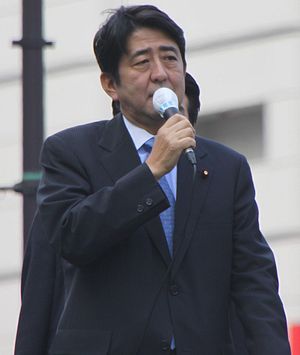On Wednesday, Japan imposed unilateral sanctions on North Korea following its satellite launch – a launch which international observers believe is a covert attempt to test long-range missile technology.
Japan had partially lifted some sanctions in 2014 when North Korea promised to look into the fate of Japanese abducted by North Korea in the 1970s and 1980s, but most of these were re-imposed in reaction to the Kim regime’s nuclear test on January 6 and missile test on February 7.
The new sanctions ban North Korean nationals from entering Japan. They also ban remittances, except for those less than 100,000 yen ($890) and for humanitarian purposes only. Furthermore, North Korean ships and any ship that has stopped in North Korea will no longer be allowed to call in Japan.
Additional measures that go beyond sanctions that existed prior to 2014 include a freeze on assets held by suspect individuals and organizations in Japan, and a ban on nuclear and missile-related foreign technicians who have been to North Korea from reentering Japan.
It is difficult to say that sanctions have been effective in achieving Japan’s policy objectives – be they objectives related to halting North Korea’s nuclear and missile programs or the return of Japanese abductees. Furthermore, Japan’s economic relationship with North Korea is so minuscule that the newest set of sanctions is unlikely to make much of a difference to the North’s economic calculus.
Perhaps, then, the greatest significance of these sanctions is their function as a signal to allies that Japan is willing to work with like-minded states to push forward with limiting the North’s options – despite, or maybe in light of, the significant delay in enacting tougher multilateral sanctions through the UN Security Council, where China holds a veto. After the sanctions were decided on, Chief Cabinet Secretary Yoshihide Suga stated: “We are closely cooperating with the United States and South Korea. I hope Japan’s unilateral sanctions will lead the international community to promptly execute strict measures based on a UN Security Council resolution” (emphasis added). After the nuclear test, Japan’s plan had been to wait until after the UNSC sanctions, but with the missile test, it appears that Japanese policymakers believe there is no longer any value in waiting for the dithering UNSC.
The abductees issue also hamstrings Japanese decision-making – a problem unique to Japan that has the potential to be a wedge issue between Japan and Japan’s allies. Even as Suga announced the new sanctions, he explicitly stated that the door will be kept open for further dialogue on the abductees issue. This is because it is politically impossible for Prime Minister Shinzo Abe to give up on the return of (or at least the clarification of what happened to) the abductees, as it was his hawkish stance on this very issue that propelled him to the national stage. Even in this instance, Abe had Katsunobu Kato, state minister in charge of the abduction issue, meet with members of the Association of the Families of Victims Kidnapped by North Korea on Monday to gain their understanding before imposing the harsher sanctions.
Despite the increased strictness of the new sanctions on paper, due to their apparent ineffectiveness in real terms, Japan is confronting the reality that it needs to be prepared to do more to defend itself. Japan is considering upgrading to a next-generation missile interceptor; the old interceptors can hit targets only up to 300 km above ground, while the new ones, which can be loaded on Aegis-equipped destroyers, can reach up to 1,000 km. What this means is that if Japan begins using the Standard Missile-3 Block IIA system, Japan will be able to protect its territory with just two, instead of three, Aegis destroyers. Japan may also consider installing the land-based Terminal High Altitude Area Defense (THAAD) system. Discussions on that topic between the United States and South Korea have generated a fierce backlash from China – any Japanese movement toward THAAD deployment is likely to meet with similar objections. As South Korea begins formal talks with the U.S. about deploying THAAD, Abe expressed support for such a deployment in his phone call to South Korean President Park Geun-hye on Tuesday.
Trilateral cooperation between the Japan, the United States, and South Korea is also moving forward on the military front, as the top military officers agreed on Wednesday to step up information-sharing and coordination of security efforts.
What else can Japan do? An interesting option is for Japan to focus more of its energy on helping other countries better enforce sanctions against North Korea. Japan, the United States, and South Korea recently agreed to help build the capacity of Southeast Asian states that still trade with North Korea to interdict contraband bound for the North. There are also discussions about Japan giving development aid to help train foreign customs agents and provide equipment to better detect shipments of banned materials.
As North Korea has been a challenge Japan dealt with for decades now, it might be time to try such new ideas – working together with Japan’s traditional allies, the United States and South Korea, of course.
































